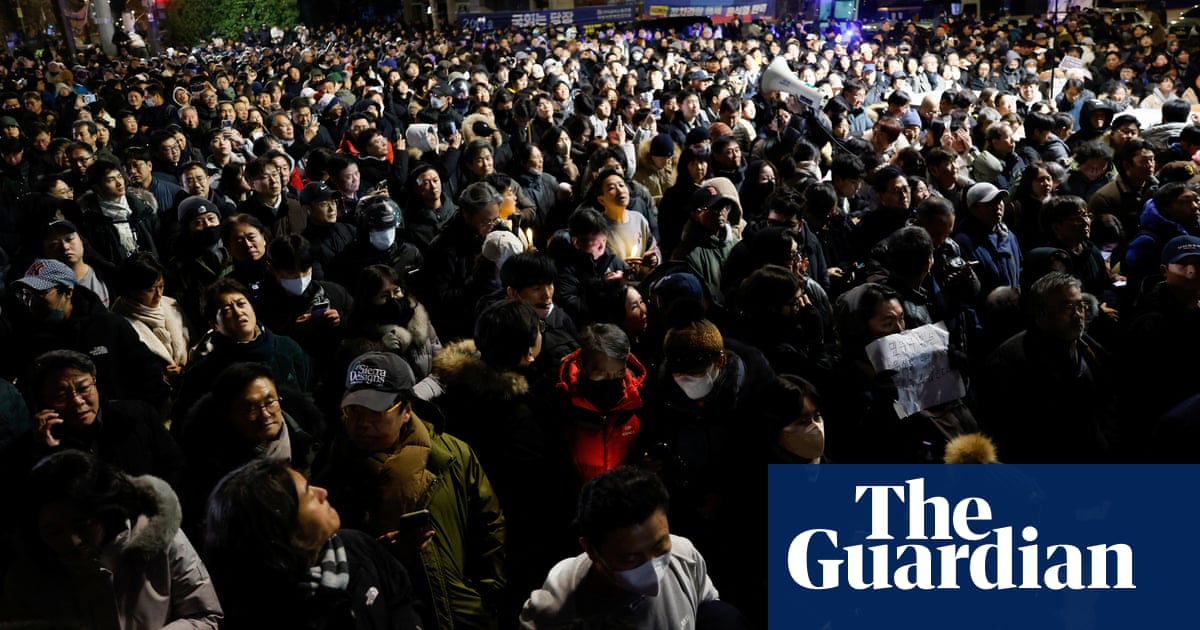In attempting to declare martial law, South Korea’s president, Yoon Suk Yeol, sought to awaken ghosts that the rest of the country thought had been laid to rest for good.
The last time martial law was declared, in 1980, hundreds of people were killed by the military dictator Chun Doo-hwan, who sent protesters to a concentration camp for “purificatory education”.
In the course of his meteoric rise to power from prosecutor to president, Yoon outraged much of the country by making complimentary remarks about Chun, claiming three years ago that many people thought the general had done well in politics apart from his coup and the crushing of protests.
Yoon, a lawyer and political neophyte, was forced to issue an apology and visited the memorial in Gwangju to the biggest massacre of the Chun era, but many of his critics were sceptical about the sincerity of his retraction.
They were also alarmed by Yoon’s promotion to senior positions of members of the country’s New Right Movement, which combines a commitment to free market economics with a revisionist view of the Japanese colonial era and its earlier periods of dictatorship.
Yoon’s short-lived declaration of martial law appears to have been a desperate gamble in the face of rock-bottom public popularity – with positive ratings barely over 10% – in the midst of a doctors’ strike and staunch political opposition, increasingly including his own People Power party, whose leader, Han Dong-hoon, said the move was a “wrong move”.
Yoon may have thought that his nostalgia for authoritarianism would resonate with at least some of the South Korean political spectrum, but the unanimous vote in the national assembly to overturn his declaration, including by his own party, suggests he miscalculated. Within hours, he was forced to back down, and martial law was formally lifted after a cabinet meeting.
John Nilsson-Wright, the head of Cambridge University’s Japan and Koreas programme, said: “The fact that he’s acted this way I don’t think really reflects any strong nostalgia on the part of the right for the authoritarian style of leadership. I think it’s a reflection of Yoon’s personality.
“The political momentum was already seeping away from the president, which may be why he decided to act in this way. But it was a foolhardy and deeply misguided decision, and I suspect it will have backfired, if the early indicators are anything to go by.”
The unknown quantity is the military. After forces were sent in to the assembly, there were reports on Tuesday that at least some of those troops were being withdrawn, though the military leadership reportedly announced that it would maintain martial law until it was told otherwise.
The army chief of staff, Gen Park An-su, declared a ban on all political activities and the imposition of military control on “all news media and publications”, but those declarations were entirely ignored. The national assembly was in ferment, the streets filled with protesters and Korea’s robust news organisations continued to report events as they unfolded.
It is unclear whether Park’s initial pronouncements arose from sheer uncertainty about the constitutional legality of such an unprecedented situation or genuine enthusiasm for a coup. In his late night address, Yoon said that troops would return to their barracks, but historically, armies that have tasted political power are rarely entirely cured of the bug.
Yoon’s invocation of a foreign threat, in the form of “North Korean communist forces” and their supposed sympathisers in the South, appear flimsy in the extreme, but carried with it the risk of becoming a self-fulfilling prophecy.
In Pyongyang, Kim Jong-un is enjoying a resurgence, rescued from complete isolation by Vladimir Putin’s desperate need for military aid in Ukraine. It seems highly likely that he will seek to exploit Seoul’s hour of weakness. Any aggressive move from the North could provide retrospective justification for Yoon and the military.
“For a president who has focused so much on South Korea’s international reputation, this makes South Korea look very unstable,” Mason Richey, a professor at Hankuk University of Foreign Studies in Seoul told Reuters. “This will have a negative effect on financial and currency markets and South Korea’s diplomatic place in the world.”

